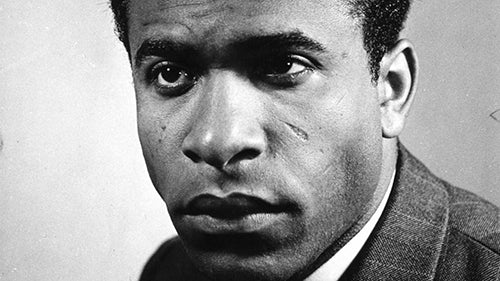Frantz Fanon in Algiers
“Non, non, non: stay upright on your own two feet and keep moving forward to goals of your own," said Frantz Fanon to Elaine Mokhtefi in Algiers.

An extract from Elaine Mokhtefi’s Algiers, Third World Capital: Black Panthers, Freedom Fighters, Revolutionaries (coming out August 7, 2018). See all our forthcoming Autumn publishing here.
Frantz Fanon was born and raised on the West Indian island of Martinique, then a French overseas department (a territory whose relation to France was on the order of Puerto Rico’s to the United States). During the Second World War, Fanon managed to escape the island’s Vichy regime to enlist with de Gaulle’s Free French Forces. He was shipped to North Africa, where he received his first impressions of colonial Algeria while awaiting transfer to Europe. Wounded in action at Colmar near the German border, he was awarded the Croix de Guerre. He returned to Martinique in 1945, finished high school, then left for Lyon, France, where he entered medical school, specializing in psychiatry.
After the war for independence broke out in November 1954, Fanon came into contact with the Algerian Liberation Army and began providing medical and psychiatric aid, as well as shelter, to the freedom fighters. In 1956 he resigned from his medical post. In an open letter addressed to Robert Lacoste, the resident general of Algeria, he declared:
If psychiatry is the medical technique that aims to enable man no longer to be a stranger in his own environment, I affirm that the Arab, permanent alien in his own country, lives in a state of absolute depersonalization. The events in Algeria are the logical consequence of an abortive attempt to decerebrate a people.12
Lacoste subsequently deported Fanon from Algeria. So the doctor and his family made their way to Tunis, where he joined the Algerian provisional government headquarters and immersed himself in a variety of roles: as staff writer at El Moudjahid, the FLN newspaper, and as psychiatrist and head of a day clinic for Algerian freedom fighters and war victims. He lectured to officers of the Algerian Liberation Army at Ghardimaou on the Algeria–Tunisia border.
Fanon’s rise in the Algerian hierarchy was phenomenal—especially considering that he was neither Algerian-born or raised, nor was he Muslim. In December 1958, Fanon headed the Algerian delegation to the All-African People’s Conference in Accra, a short-lived but politically powerful organization. It was there that he met and developed close relationships with Patrice Lumumba from the Congo, Holden Roberto (alias Rui Ventura) of Angola, and Félix Moumié of Cameroon. In 1959, he was named the first Algerian ambassador to Ghana. It was there that I met him.
Fanon had a long face, a strong, wide jaw, and deep-set, probing eyes. He was short, his body taut. The overall picture was of intensity, a man in a hurry and driven. As an official observer at the WAY congress, Fanon was invited to address the delegates.
One night Fanon and I went dancing. A Ghanaian photographer focused his camera on us. Frantz caught him on the edge of the dance floor, and warned him to destroy the photo (it appeared nonetheless in an Accra newspaper a few days later). The FLN had placed a boycott on all French cigarettes. When I shared my Gauloises with him, we became partners in guilt, breaking the ban together.
He once asked me what I wanted in a relationship. When I answered, “To put my head on someone’s shoulder,” he was adamant: “Non, non, non: stay upright on your own two feet and keep moving forward to goals of your own.” His words would come back to me often, and I have repeated them to others in need of that advice, as I was at the time.
This is a revised extract from Elaine Mokhtefi’s Algiers, Third World Capital Black Panthers, Freedom Fighters, Revolutionaries (coming out August 7, 2018). See all our forthcoming Autumn books, and more preview extracts, here!
